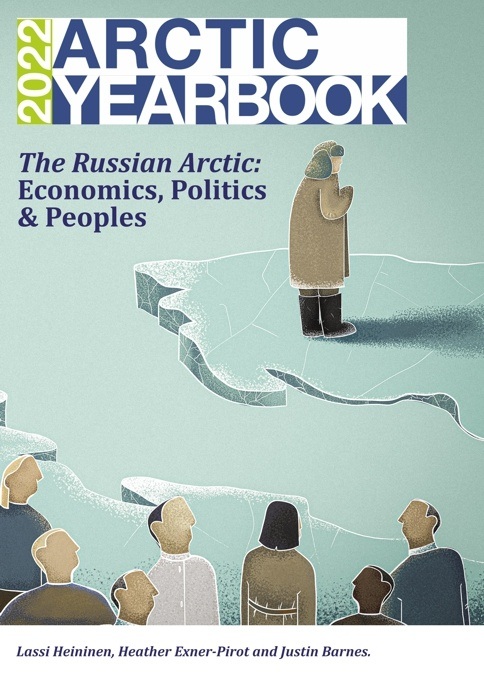Theme: Arctic Indigenous Peoples: Climate, Science, Knowledge and Governance
Call for Abstracts (deadline): 15 March 2023 (250-400 words)
Draft papers (deadline): 15 June 2023 (4500-6500 words)
The Arctic Yearbook is calling for abstracts for its 2023 volume.
The Arctic Yearbook is an international and peer-reviewed volume which focuses on issues of regional governance, development, environmental politics, circumpolar relations, geopolitics and security, all broadly defined. It is an open access, online publication.
This year's theme is "Arctic Indigenous Peoples: Climate, Science & Knowledge and Governance". The Arctic is currently home to over 4 million people, many of whom are Indigenous and have lived in the region since time immemorial. Building on inherent Indigenous knowledge systems, Indigenous peoples of the Arctic contribute throughout science and diplomacy in responding to various challenges and crises. As many northerners and Indigenous leaders from across the Circumpolar Arctic have articulated, Arctic residents and Indigenous Peoples are at the front lines of the climate crisis, of a changing geopolitical environment, and of shifts in international natural resource interests towards the Arctic region. At the same time, Arctic Indigenous Peoples continue to respond to a wide variety of important challenges related to colonial legacies, environmental catastrophe, and other interrelated socioeconomic challenges in the Arctic, while calling for inclusive and integrated knowledge systems to inform solutions and decision making.
While questions remain about the future of international Arctic cooperation, particularly at the Arctic Council, the evolving processes that have been increasing the involvement of Indigenous Peoples in Arctic governance at the national and international level since the 1970s have had important influences on regional and international politics. Bolstered more recently by increasing international recognition of Indigenous human rights frameworks including UNDRIP and of the many challenges Indigenous Peoples are managing, there is a need to consider the central role of Indigenous Peoples in governance frameworks, policies, knowledge production and programs, while addressing transboundary challenges like climate change.
Of particular interest are discussions and critical analyses on the following topics:
- the impacts of climate change and the climate crisis on Arctic peoples and communities and local and regional responses to emerging challenges
- issues and responses related to human health, including mental health, food sovereignty and insecurity, and other local-level challenges in Arctic Indigenous communities
- Local, regional and global governance mechanisms, including those related to the devolvement of governance, Indigenous governance, and/or multi-level & -stakeholder governance relationships, particularly in relation to national governance and state-controlled climate policies
- devolution, self-determination, and self-governance as a means to tackle the climate crisis
- resource governance, including maritime and extractive industries, and sustainable development in the Arctic
- Indigenous knowledges (vis-a-vis scientific knowledge), the integration of knowledge systems in climate and environmental sciences
- the roles and influence of the Permanent Participant organizations of the Arctic Council and at other international fora including the various UN bodies
- continued cooperation with, and support of, Indigenous Peoples in the Russian Arctic
Other topics of contemporary significance to Arctic development, governance, geopolitics, security, and community well-being will also be welcome.
Abstracts should be 250-400 words and include author name(s), institutional affiliation and article title, to be submitted to and . The deadline for abstracts is March 15, 2023. Notice of acceptance will be provided on March 31, 2023. Articles must be submitted by June 30, 2023. Publication is planned for Fall 2023.
We also welcome proposals for commentaries (1-3 page opinion pieces) and briefing notes (4-7 page analyses) from experts and policymakers on current issues and events.
Editor
Managing Editor
Assistant Editor
Editorial Board
- (Chair) Dr. Alexander Pelyasov (Russian Academy of Sciences; Director of the Center of Northern and Arctic Economics; Ministry of Economic Development & Trade, Russian Federation)
- Dr. Lawson W. Brigham (Global Fellow, Wilson Center Polar Institute; Research Faculty, University of Alaska Fairbanks)
- Dr. Daria Burnasheva (Senior Lecturer at Arctic State Institute of Culture and Arts, Sakha Republic)
- Dr. Miya Christensen (Professor at University of Stockholm, Sweden)
- Halldór Jóhannsson (Executive Director, Arctic Portal, Iceland)
- Dr. Kirsi Latola (Research Coordinator, UArctic Vice-President Networks, Finland)
- Dr. Ólafur Ragnar Grímsson (Former President of the Republic of Iceland, Chair of the Arctic Circle)
- James Ross, (Gwich’in leader, Northwest Territories, Canada)
Source:Arctic Yearbook

